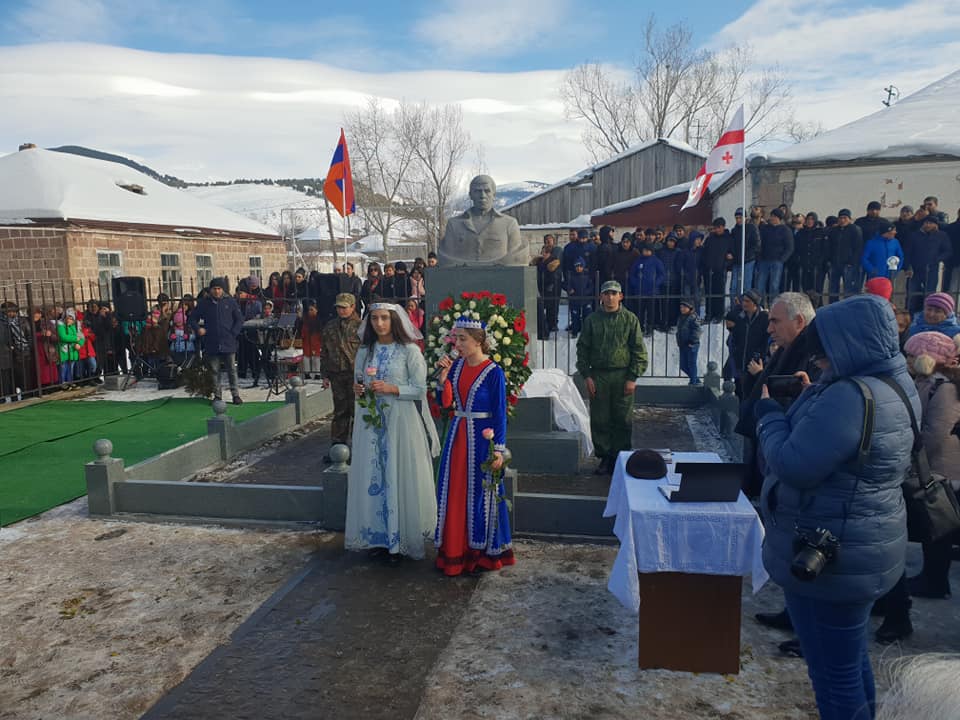Azerbaijan calls for ‘urgent measures’ after Karabakh veteran statue unveiled in Georgian village


The Georgian ambassador to Azerbaijan has been summoned to the Azerbaijani Foreign Ministry after reports emerged that a statue of an ethnic Armenian Nagorno-Karabakh war veteran was renovated in a Georgian village. Azerbaijan called on Georgia to ‘take urgent measures’, while Georgia’s Foreign Ministry told OC Media that ‘making a scandal out of this is unacceptable’.
On 20 January, the renovated statue of Nagorno-Karabakh war veteran Mikhail Avagyan was unveiled in his native village of Bughasheni, in southern Georgia’s Akhalkalaki Municipality, which is mostly populated by ethnic Armenians.
According to local news website Jnews, the statue, which has been standing in the village for around 22 years, was renovated and unveiled at a ceremony by Avagyan’s children and grandchildren.
‘When the war began in Nagorno-Karabakh, Mikhail Avagyan participated in the hostilities in Horadiz, Khojali, Hadrut, and Fizuli and became known as the “Cobra” because he knew Azerbaijani, which helped him in reconnaissance’, Jnews wrote, adding that he was wounded by a sniper during battle and died on the way to the hospital.
The bust’s opening ceremony was attended by Armenian ambassador to Georgia Ruben Sadoyan, who cut the red ribbon. It was also attended by the the mayor of Akhalkalaki and the chairman of city council, as well as Georgian MPs Enzel Mkoyan and Samvel Manukyan, both ethnic Armenians.
On 24 January, Azerbaijan’s Foreign Ministry issued a statement on the bust of Avagyan, accusing him of participating in ‘the occupation of Azerbaijani lands’.
The statement said Azerbaijan’s ambassador to Georgia had visited the Georgian Foreign Ministry to draw attention to the issue.
‘At the same time, the Georgian ambassador to our country was invited to the Ministry of Foreign Affairs, where there was a demand to take urgent measures to eliminate this development, which does not correspond to the spirit of bilateral strategic partnerships between our countries’, the Azerbaijani Foreign Ministry said.
The day the statue was unveiled, 20 January, is a day of mourning in Azerbaijan, known as ‘Black January’. On 20 January 1990, over a hundred mostly ethnic Azerbaijani civilians were killed in a Soviet crackdown on the civilian population of Baku.
Soviet President Mikhail Gorbachev said the crackdown was necessary in order to stop violence against ethnic Armenians in the city, while many in Azerbaijan assert that this was only a pretext to suppress the Azerbaijani independence movement.
‘Attempts to ignite confrontation’
Georgian MP from the ruling Georgian Dream party, Gia Volski, said there was ‘an attempt to make a scandal’ out of the developments.
‘We should care about our citizens and make sure they don’t have conflict. There is now an awkward situation internationally, but diplomacy exists to ease such situations’, Volski told journalists.
Giorgi Baramidze, a member of the opposition United National Movement Party, said Georgia should make sure its relations with both Azerbaijan and Armenia remain secure.
‘We have a government and we have a state security service which must make sure no hearth of confrontation is ignited’, Baramidze told opposition-leaning TV channel Rustavi 2.
Zaur Khalilov, the director of the Civil Integration Foundation, an organisation that helps ethnic minorities in Georgia integrate, told OC Media the Georgian government must maintain neutrality in the conflict and take on a role in building peace.
‘Evidently, there are attempts to ignite confrontation between ethnic Azerbaijanis and Armenians living in Georgia’, he said.
‘Who came up with the idea of renovating and opening the statue on 20 January? I don’t know what to blame it on — ignorance or a deliberate provocation? […] Azerbaijan took it as an insult because the opening was held on 20 January’, he told OC Media.
He said that Georgian officials tend to look at ethnic minorities only from a security viewpoint, and fears that this particular case may lead to anti-Armenian sentiments.
‘It’s a fact that [these developments] are harmful for Georgia. What will [Georgian officials] do if Azerbaijan asks for the sculpture to be demolished? And if they do demolish it, this will automatically trigger a reaction from Armenia’, Khalilov said.
Arnold Stepanyan, who chairs Multi-Ethnic Georgia, an organisation working to bridge gaps between ethnic, religious, and linguistic groups in Georgia, echoed Khalilov’s sentiments.
Stepanyan told OC Media that ‘there’s an attempt to instigate hostility between ethnic Armenians and Azerbaijanis residing in Georgia’.
‘This is a very sad fact. There are certain people who are always trying to ignite confrontations — to spread the confrontation between Azerbaijan and Armenian to Georgia’, said Stepanyan.
Enzel Mkoyan, the ethnic Armenian MP from the Georgian Dream party who attended the unveiling of the memorial, told OC Media he attended the ceremony because he was invited by his electorate, to whom he could not say no.
‘I didn’t expect there would be such tensions. My electorate invited me as their majoritarian [MP]. I couldn’t refuse their invitation. I went there and attended it’, said Mkoyan.
Asked what the solution regarding Azerbaijan’s demands could be, Mkoyan told OC Media he did not know.
‘I can’t answer this. I want a peaceful solution’, he said.









